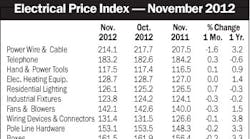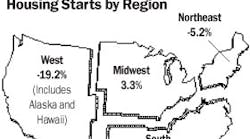In what may be one of the more interesting acquisitions in the lighting business this season, Cree Inc., Durham, N.C., announced that it's acquiring privately held lighting fixture manufacturer Ruud Lighting, Racine, Wis., for a net outlay worth approximately $525 million in combined cash and stock. A company release said a key benefit of the deal is Ruud's position in the market for LED outdoor lighting through its BetaLED fixture business.
“This acquisition creates a market leader for indoor and outdoor LED lighting, accelerating adoption and expanding the market for both Cree's LED systems and components,” the release said. “Other synergies include increased access to the lighting market through expanded sales channels and operating leverage from increased economies of scale. Through a broader presence in the lighting systems market, Cree gains additional knowledge and expertise to develop the next generation of industry-leading, lighting-class LED components.”
Ruud will stay in Racine as a division of Cree Lighting and company founder, chairman and CEO Alan Ruud will take a seat on Cree's board. His son, Chris Ruud, will continue as president of Ruud Lighting.
While many electrical distributors know Ruud Lighting for the direct-only sales strategy it has used to sell traditional lighting fixtures since 1982, in a transcription of a conference call with analysts posted on www.seekingalpha.com, Chuck Swoboda, Cree's CEO, said that in the LED world, Ruud Lighting sells its BetaLED product line through independent reps. “What we see is an opportunity that's between the Cree product line and the BetaLED LED product line,” he said. “We can now really give those reps and agents an even broader offering to really move the market and drive adoption.”
Cree sells its LED lighting products through a mix of marketing channels that includes electrical and electronics distributors and lighting reps. Michelle Murray, Cree's head of corporate communications, said in an e-mail to Electrical Marketing, “At this time we are not changing the go-to-market strategies for any of the Ruud products or Cree fixtures. Our distributors, reps and agents for lighting products are different than those for LED components, as you would expect.”
The company sells its LED fixture packages through electrical distributors and sells its LED components through electronics distributors such as Newark, Arrow Electronic Components, Mouser Electronics, WPG Americas, Digi-Key, ETG Inc., and Marktech Optoelectronics. The EcoSmart LED Downlight sold by Home Depot for the past year uses Cree LEDs.
Swoboda said in that conference call with analysts that one of the reasons Cree and Ruud are such a good match is the LED R&D that Ruud has done through its BetaLED business, which it launched in 1992 and has built up in local markets through its network of lighting reps.
“Over the last five years, Ruud Lighting has transformed into a true LED company and established their BetaLED product line as a market leader in LED outdoor lighting,” he said. “The company has grown to over $200 million, with more than 60 percent of their sales in LED-based products and more than 4,000 installations in over 1,000 cities. As one of the true industry innovators, Ruud has developed patented NanoOptic technology to deliver industry-leading efficiency, proprietary thermal management for longer life times and a strong patent portfolio. They have established a solid channel for the BetaLED business and also have strong direct-to-customer and direct-to-contractor channels with their Ruud Lighting and E-conolight brands.
“In terms of driving LED adoption, there is probably no better example than the city of Los Angeles project. The BetaLED LEDWay product helped enable the largest LED lighting retrofit undertaken to date. The city is replacing 140,000 streetlights with LED streetlights and estimates that they will save $10 million per year with a payback of 6 years or less and 55% energy savings.”
Alan Ruud is known in the international lighting community as one of the most successful entrepreneurs in the field. He founded Ruud Lighting in 1982 with a partner, Don Wandler, when they started building prototype products in the garage of Ruud's home in Racine, Wis. The company was unique right from the start in that it used a business model of selling directly to electrical contractors and promoting its products heavily and regularly at industry trade shows and through trade magazine advertisements in end-user publications such as Electrical Construction & Maintenance, EM's sister publication, and Electrical Contractor magazine.
Ruud sold Ruud Lighting to publicly-held Advanced Lighting Technologies Inc. (ADLT) in 1998, but bought it back in 2001 when ADLT ran into financial difficulties. According to his bio, he earned a B.S. in electrical engineering from the Milwaukee School of Engineering and an MBA from the University of Chicago. In the early years of his electrical career, Ruud was a partner at Goulet-Ruud & Associates-Electrical Consulting Engineers, Milwaukee. In 1975, he founded SPI Lighting, and later sold the business to McGraw-Edison where he served as vice president until 1982. Ruud also served as vice chairman, president and chief operating of ADLT from 1998-2001.
Cree reported in its 2010 10-K that its annual revenues for its fiscal year ending June 26 increased 14 percent to $987.6 million. Despite this sales growth and a healthy gross margin of 44 percent (down three percent from fiscal 2009), its net income declined to $146.5 million in 2010 and its stock price is currently down approximately 43 percent over the past 52 weeks to about $29 per share at press-time.
For more information on this acquisition, be sure to check out the Q&A with Chuck Swoboda and Alan Ruud moderated by The Edison Report on www.seekingalpha.com, and the transcript of the Swoboda's conversation with analysts following the deal.

